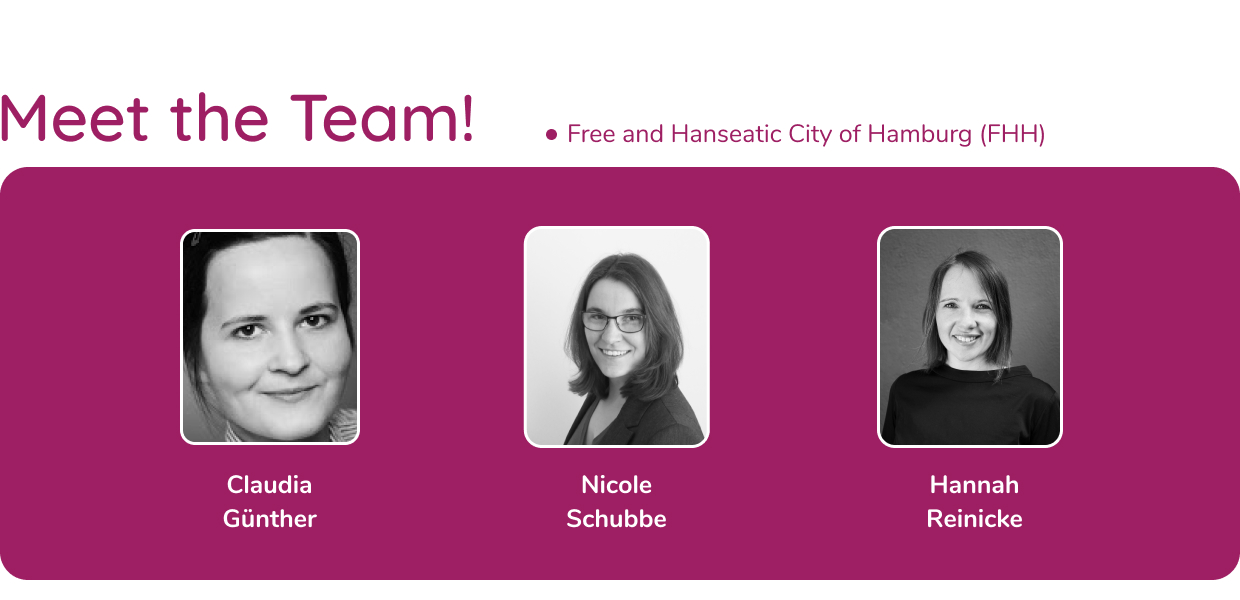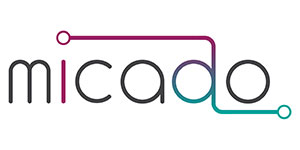
09 Jun Meet the Team – Free and Hanseatic City of Hamburg (FHH)
Meet the team interview
The Free and Hanseatic City of Hamburg, one of the 16 states of the federation, is the second-largest city in Germany with 1.8 million inhabitants. In this sense, it is a city as well as a state. As a member of EUROCITIES, Hamburg shares its experience with European cities and regions and works actively in several forums and workshops on national and international levels. The City of Hamburg is represented by the Senate Chancellery and the Agency for Geoinformation and Surveying in the MICADO project.
Firstly, tell us a bit about the work you do at the Free and Hanseatic City of Hamburg.
Claudia: As coordinator for Horizon2020 projects in the Senate Chancellery, I ensure that the projects in which the city-state participates are carried out sustainably. That means involving the right people from the right authorities and districts and finding good solutions for specific needs.
Nicole: I am working in the Urban Data Hub. Here I am coordinating with data owners in the city to connect their data to Hamburgs Urban Data Platform. Besides MICADO I am working in another EU-Project called SCORE (NSR). Furthermore, I am leading the Coordination Office Spatial Data Infrastructure of the Metropolitan Region of Hamburg.
Hannah: I am working in the Urban Data Hub which is part of the Agency for Geoinformation and Surveying in Hamburg. Besides my work in the MICADO project, I’m responsible for advising and supporting different data owners in Hamburg in order to connect their data sets to the Urban Data Platform Hamburg. Within my organization, I’m also supporting our Chief Digital Officer (CDO).
What was your motivation to developing/working in the MICADO project?
Claudia: To develop a technical solution that improves the connections between existing integration procedures and offers and make them more accessible.
Nicole: I liked the idea of MICADO to link existing information on migration in one tool, instead of creating another tool for one special use case.
Hannah: Especially Micado triggered me, because of the great opportunity for the City of Hamburg to collaborate with local NGOs, migrants and Public Authorities within one project and producing a tool that improves integration processes for the entire target group. This kind of cooperative work is really motivating me.
What do you think are the main challenges you will encounter during the MICADO project implementation?
Claudia: Regarding the development of the “one-fits-all” MICADO solution, it will be a great achievement to collect and map the different needs in the pilot cities Antwerp, Bologna, Hamburg and Madrid and to find the common ground. Because these shared requirements are the basis for the development of the universal MICADO solution. Thinking about the sustainability of digital applications, I think the biggest challenge is to integrate MICADO into the existing IT infrastructures of the four piloting cities.
Nicole: From my experience, the main challenge will be the technical sustainability of the data connections (and updates) as well as sustainable implementation of developed products. Another challenge will be to raise acceptance among migrants.
Hannah: Keeping the data up-to-date and adapting the data collection process to upcoming proceedings in four different countries and for four different domains will become a challenge during the project implementation.
What do you hope to achieve by the end of the project?
Claudia: From a local perspective, we aim to integrate MICADO into the IT infrastructure of the city. This is a major task because the most relevant local partners have to be identified and inspired for the MICADO project and technical interfaces have to be created. I also very much hope that we can convince NGOs and migrants of the advantages of the MICADO applications. When all three user groups will actively participate, the greatest benefit of the use of MICADO will be derived.
Nicole: I would be happy, if we manage to get a tool, that can be adopted to our existing Masterportal solution, which ensures sustainability for Hamburg and opens MICADO up to more than 20 other partners in Germany, using the Masterportal.
Hannah: I hope, at the end of the project, we will have created a sustainable tool that is used by our target group and inspires other cities to adapt it. For Hamburg, I hope we will have collected all relevant data and connected them to the Urban Data Platform in order to ensure further interdisciplinary use.
What do you personally find most interesting/exciting about the project?
Claudia: The participatory approach of the project, which involves stakeholders and future users in the process of development from the very beginning. Stakeholders and future users are actively taking part by sharing and discussing their specific needs, by testing the first versions of the digital tools and giving feedback on a regular basis. This way, the MICADO solutions will be highly user-orientated and we hope that we will reach a decent number of users in the piloting phase. Furthermore, involving local experts, stakeholders, and users early on creates very good conditions for the MICADO applications to continue to be used and further developed after the end of the project.
Nicole: As I am usually working with geodata it is interesting for me to work with non-geodata for the first time. The topic of migration is very relevant and I am happy to contribute.
Hannah: Working cross-national with diverse people is always a huge incentive for my work. In the context of MICADO, I am excited about the dynamics that data can generate in the field of Migration. It’s the first time for me to work in a project that combines those two topics.
